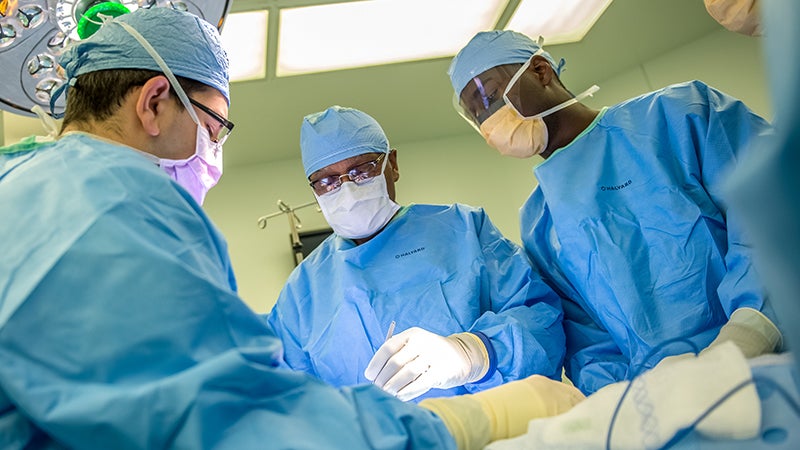Suffolk native to lead health care study
Published 10:24 pm Thursday, August 31, 2017

- Dr. L.D. Britt, center, a Suffolk native and the chair and professor of surgery at Eastern Virginia Medical School, performs a surgery in the operating room. He is the lead investigator on a study that will determine the reasons for health care disparities in the United States. Courtesy of Eastern Virginia Medical School
Suffolk native Dr. L.D. Britt will lead a historic effort to investigate surgical disparities in the United States.
Throughout his career, Britt has led the charge against disparities in access and outcomes of health care. He vividly recalls families in his Suffolk community when he was a child packing lunch and dinner when they went to see the doctor, because they had to wait six hours or more.
“I knew something was wrong,” he stated in a press release. “There just weren’t enough doctors.”
Britt, who now is the chair and professor of surgery at Eastern Virginia Medical School, will lead the historic effort by the American College of Surgeons to confront the problem. A $2.5 million grant from the National Institutes of Health will fund research into why disparities exist so that these disparities can be mitigated.

Dr. L.D. Britt, a Suffolk native and the chair and professor of surgery at Eastern Virginia Medical School, performs a surgery in the operating room. He is the lead investigator on a study that will determine the reasons for health care disparities in the United States.
Courtesy of Eastern Virginia Medical School
“This is a key research initiative,” Britt said Thursday. “No one has done this. That’s why it’s so historic.”
Britt believes disparities in health care are the biggest challenge in America.
“The greatest challenge facing this nation is health care disparities,” Britt stated in the press release. “There are widening disparities as far as who has access and what sort of therapeutic options patients have. It’s probably the biggest embarrassment for the nation, and it’s unacceptable.”
Britt said many people think first of racial disparities, and they do exist but probably aren’t the biggest challenge.
“One of the most significant driving forces in health care disparities is poverty and where you live,” he said. “If you’re poor, you’re not going to have the same health care options as somebody who is not poor. If you’re in a rural area, you don’t have the same access as somebody in a more urban setting.”
Even factors such as the patient’s level of formal education also play a role in health care disparities, Britt said.
“This is a major, significant social burden on the United States when you have inequality, because at that point, you end up spending more money and you have bad outcomes. We need to level the playing field so everybody has the same quality of care.
“At the end of the day, what we’re trying to do is reduce disparities and improve outcomes.”
Britt’s team of collaborators includes surgeons at Harvard and at the University of California—Los Angeles, among others.
“I’m fortunate to be the principal investigator,” he said. “It’s going to require major investigative work, but I think I have the team.
“This is something that will have an impact not just in the surgical communities but in the greater community.”




